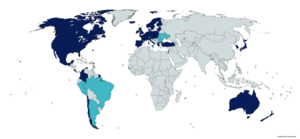
OECD
Intergovernmental economic organisation / From Wikipedia, the free encyclopedia
Dear Wikiwand AI, let's keep it short by simply answering these key questions:
Can you list the top facts and stats about OECD?
Summarize this article for a 10 years old
The Organisation for Economic Co-operation and Development (OECD; French: Organisation de coopération et de développement économiques, OCDE) is an intergovernmental organisation with 38 Member countries,[1][4] founded in 1961 to stimulate economic progress and world trade. It is a forum whose member countries describe themselves as committed to democracy and the market economy, providing a platform to compare policy experiences, seek answers to common problems, identify good practices, and coordinate domestic and international policies of its members.
| Organisation de coopération et de développement économiques | |
 | |
 Member states Applicants | |
| Abbreviation |
|
|---|---|
| Established | 16 April 1948 (75 years ago) (1948-04-16) (as OEEC) 30 September 1961 (61 years ago) (1961-09-30) (as OECD) |
| Type | Intergovernmental organisation |
| Headquarters | Château de la Muette Paris, France |
Membership |
|
Official languages |
|
| Mathias Cormann | |
Deputy Secretaries-General |
|
Budget | €338.3 million (2023)[3] |
| Website | www |
The majority of OECD Members are high-income economies ranked as "very high" in the Human Development Index, and are regarded as developed countries. Their collective population is 1.38 billion.[5] As of 2017[update], OECD Member countries collectively comprised 62.2% of global nominal GDP (US$49.6 trillion)[6] and 42.8% of global GDP (Int$54.2 trillion) at purchasing power parity.[7] The OECD is an official United Nations observer.[8]
In April 1948, the Organisation for European Economic Co-operation (OEEC)[9] was established to help administer the Marshall Plan, which was rejected by both the Soviet Union and its satellite states.[10] This would be achieved by allocating the United States' financial aid and implementing economic programs for the reconstruction of Europe after World War II.[11] Only Western European states were members of the OEEC. Its Secretaries-General[12] were the Frenchmen Robert Marjolin (1948–1955) and René Sergent (1955–1960). On 14 December 1960,[13] the OEEC was reformed into the Organisation for Economic Co-operation and Development, which came into force in late September 1961, and the membership was extended to non-European states, the first of which were the United States and Canada.[14][15]
The OECD's headquarters are at the Château de la Muette in Paris, France.[16] The OECD is funded by contributions from Member countries at varying rates and had a total budget of €338.3 million in 2023,[3] and is recognised as a highly influential publisher of mostly economic data through publications as well as annual evaluations and rankings of Member countries.[17]